A Challenging Winter Ahead…
Survival as beekeepers relies on our ability to work with and read nature and to balance the sometimes conflicting environmental challenges.
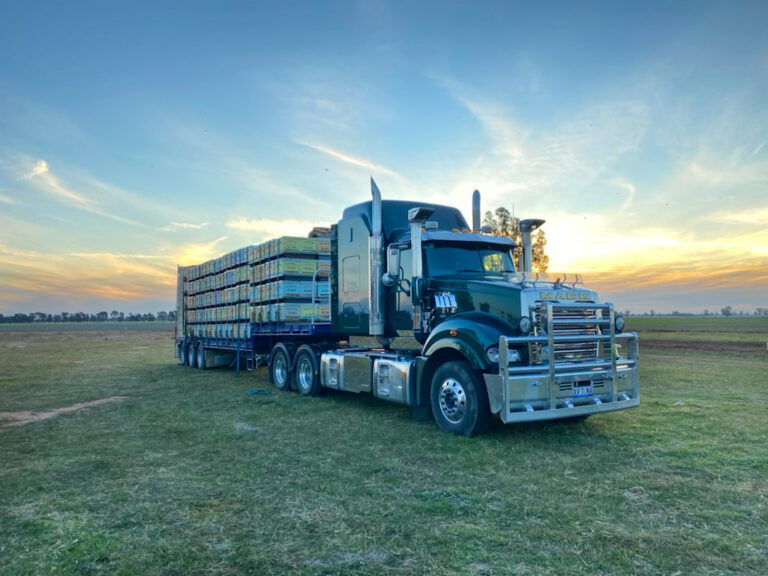
The Beechworth Honey truck, loading and bound for Qld.
A changing climate is at the back of all of our minds. In our world of bees, trees and nature we see and feel first-hand changes to our seasons. Survival as beekeepers relies on our ability to work with and read nature and to balance the sometimes conflicting environmental challenges.
This week we reluctantly did something we’ve never done before. We hauled our largest ever single load of bees the furthest distance we’ve ever shifted bees. Never before in over 130 years has anyone in our family shifted bees 1600kms from home. Every beekeeper has a preference for working as close to home as possible, it’s better for everything, convenience, cost and not to mention food miles.
The Problem
Normally at this time of the year all our hives are packed down to one single box (to keep the bees warmer during the cold) and we leave them with enough stores of honey and pollen to last the winter.
The end of this season has been a struggle for our bees locally, many are lighter than we like them to be and around 500 hives had gone “broodless” (a term used by beekeepers to mean that they’ve stopped breeding).
Usually this doesn’t happen until mid to late winter and if it happens early then it’s likely that there won’t be enough young bees in the hive to last the winter (young bees hatch from the brood). If this happens the hive dwindles and dies because there are no young bees to replace the older bees who are at the end of their life span.
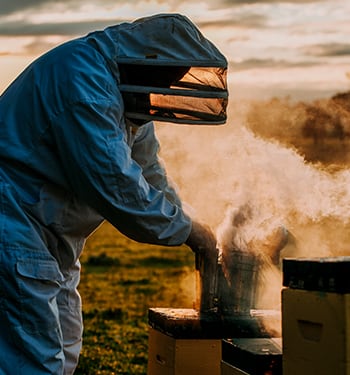
Packing down the boxes for winter
Our Choice
To manage this problem we have to find good sources of pollen for the bees. Trouble is at this time of the year in southern Australia everything has stopped flowering. The only flowers available are some ground flora crops in southern Queensland. To best look after the health of the bees we always prefer flowers for the bees as opposed to having to supplementary feed them.
When you’re faced with situations like this you can’t help but feel conflicted, long distances, food miles and balancing the nutritional needs of the bees. Which should win out? The needs of the bees have to. Not to mention the 3+ days of driving for Steven and Ben to get them there and get home which is not something any beekeeper tackles for fun.
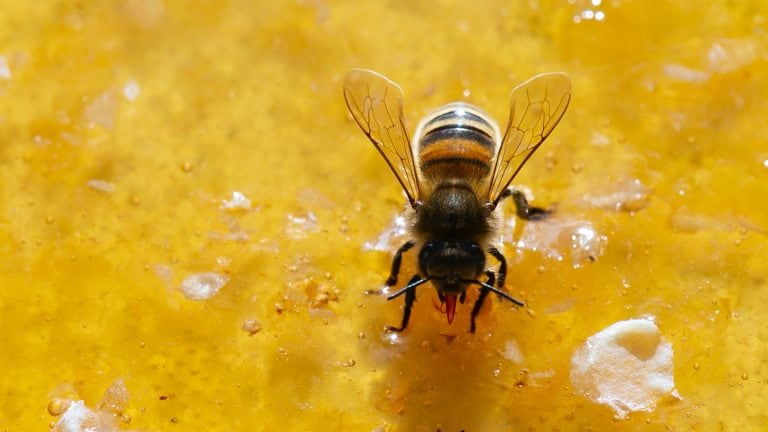
Decisions
So the decision is made and the bees are accumulated into one big load over a few nights before the big trip. Then loaded and carefully covered and the plan is to travel as much of the trip as possible during the night with the bees tucked up inside their hives.
Weather is checked to choose the coldest days possible for travelling, this also keeps the bees tucked up inside. Routes are carefully planned to coordinate stops in safe places.
Along the way loads are constantly checked to ensure the precious livestock are all travelling well. Ben and Steve take it turn about. One drives and one sleeps.
Arriving near Kingaroy then the unloading job starts, to put them in the planned sites at the destination. This time our Queensland beekeepers have returned an earlier favour – this time we use their locations for our hives.
During the fires we helped them out with our locations when they had to move south. Before we turn the truck for home we pick up a load of honey from the Rasmussens, beekeepers like us who live nearby. The truck is there and empty, the least we can do is maximise the trip with a load of honey home.
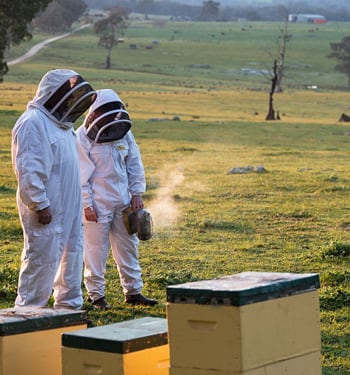
Disrespect of Nature
Back here it’s quieter with the two beekeepers in the house away. A bit more time, it seems, to walk my usual loop. On my way I take time to notice nature. A plastic bottle along the side of the road, a discarded covid mask, a muesli bar wrapper, a small brown bar fridge dumped hidden behind a tree (when did that get there?). The closer I look the more I see. It’s as though for some reason this morning I’m seeing things that I’d stopped seeing. I walk this walk often. I’m annoyed with myself for not taking a bag to collect what I can in it. I wonder if the dog is seeing it too or the kangaroo I hear bounding out of sight through the trees. I wonder if the kangaroo noticed when the fridge arrived.
I think about the reason why our beekeepers are not at home, why we can’t sustain the bees here this season and the rubbish symbolises all of our small but cumulative actions that got us to this point. I think about the choices our family and our business make, about what I could change more and about what else I could or should do. How do we stop to notice nature more? How do we recalibrate and recalculate?
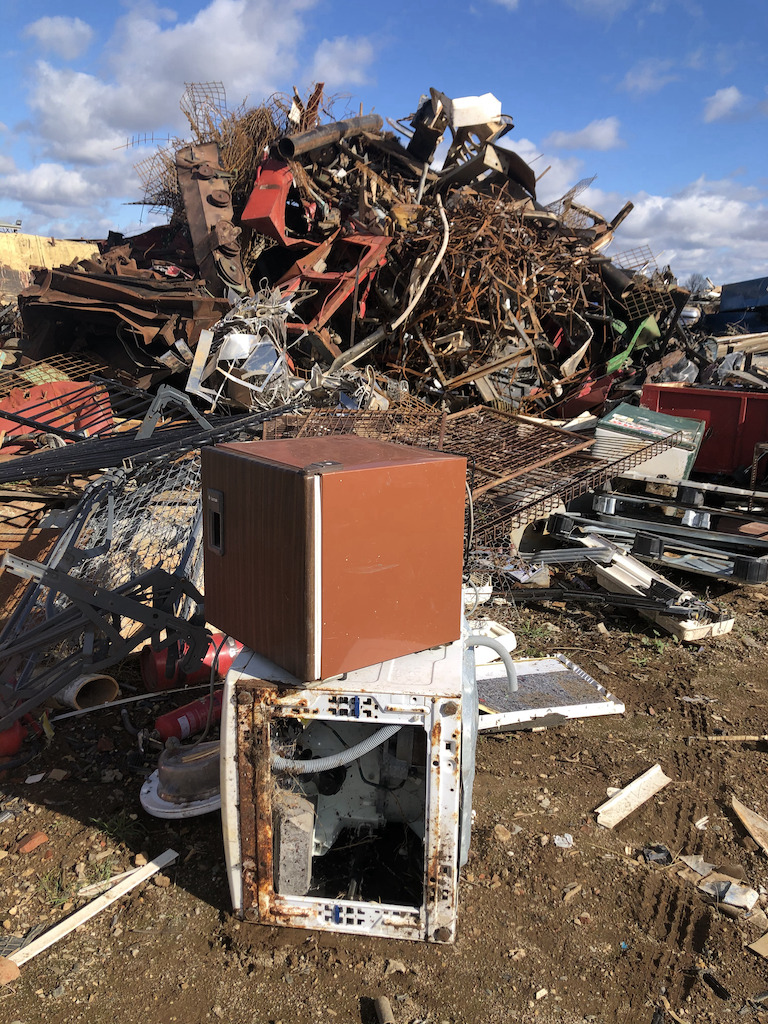
Dumped bar fridge taken to scrap metal yard
Reflections
In the reflection of the cold north east morning I make a small personal pledge to myself – that from now on I will carry an old backpack and fill it with rubbish that I find on my walk. I’m sure I’ve heard of others doing this long before me I conclude. And then I imagine even half the walkers across our lands taking up arms for our planet and carrying a backpack to fill with rubbish on their walks.
The last hill before home jolts me back to the day ahead but my wish for World Environment day is for us all to use the day to notice nature. If more of us did this on World Environment Day then who knows what new personal rituals might unfold to take a little more care of the very precious earth we all know we are borrowing from our children and their children’s children.

